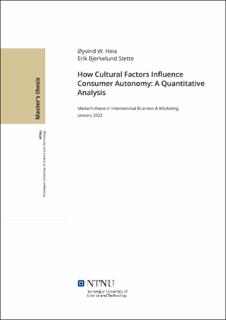| dc.contributor.advisor | Pasquine, Mark | |
| dc.contributor.author | Heia, Øyvind W. | |
| dc.contributor.author | Stette, Erik B. | |
| dc.date.accessioned | 2022-08-27T17:19:13Z | |
| dc.date.available | 2022-08-27T17:19:13Z | |
| dc.date.issued | 2022 | |
| dc.identifier | no.ntnu:inspera:115635883:115795630 | |
| dc.identifier.uri | https://hdl.handle.net/11250/3013946 | |
| dc.description.abstract | Formål - Hensikten med denne studien er å validere og analysere hvordan kulturelle faktorer påvirker nivået av forbrukerautonomi.
Design/tilnærming – Forskningsspørsmålet ble delt inn i fire hypoteser og besvart med en kvantitativ tilnærming, hvor et spørreskjema ble distribuert via Facebook og andre sosiale medieplattformer. I tillegg ble det utført en Adaptive Conjoint Analysis for å gi kontekst til eksterne faktorer og teste viktigheten av forbrukerautonomi. Data ble samlet inn fra 104 respondenter fra Norge, og analysert med SPSS.
Funn – De viktigste funnene var gjennom hypotesene som beviste at dimensjonene maktdistanse, individualisme og maskulinitet alle har et statistisk signifikant positivt bidrag til å forklare forbrukerautonomi.
Originalitet/pålitelighet - Forskning med informasjon om hovedformålet med denne oppgaven er svært begrenset. Timer med forskning resulterte i samme resultat: Lite eller ingen litteratur inneholdt konkret informasjon om forholdet mellom de kulturelle dimensjonene og forbrukerautonomi. Det positive med dette er at vi er i stand til å analysere og presentere et unikt bidrag til vår forskning. På den annen side gjør dette store gapet det noe vanskeligere å implementere et representativt grunnlag for alle hypoteser. Det understrekes derfor at teori om autonomi på dets generelle grunnlag vil bli anvendt, sammen med teoretiske og logiske tilnærminger for å kunne foreslå hvordan de seks kulturelle dimensjonene bidrar til å forutsi graden av forbrukerautonomi, i våre analyser. Når det gjelder pålitelighet, ble litteratur kun hentet fra artikler gjennom Google Scholar og NTNU Oria. Dette for å sikre en pålitelig og pålitelig litteraturgjennomgang som danner grunnlaget for en representativ artikkel innen fremtidig forskning.
Nøkkelord - forbruker, autonomi, kultur, kulturelle dimensjoner, kunstig intelligens, | |
| dc.description.abstract | Purpose - The purpose of this study is to validate and analyze how cultural factors influence the level of consumer autonomy
Design/approach - The research question was divided into four hypotheses and answered by a quantitative approach, where a questionnaire was distributed via Facebook and other social media platforms. Additionally, an Adaptive Conjoint Analysis was conducted to provide context to external factors and test the importance of consumer autonomy. Data was gathered from 104 respondents from Norway, and analyzed using SPSS.
Findings - The most important findings were through the hypotheses that proved that the dimensions of power distance, individualism and masculinity all have a statistically significant positive contribution in explaining consumer autonomy.
Originality/reliability: Research with information about the main purpose of this thesis is very limited. Hours of research resulted in the same result: Little to no literature contained concrete information about the relationship between the cultural dimensions and consumer autonomy. The positive thing about this is that we are able to analyze and present a unique contribution to our research. On the other hand, this large gap makes it somewhat more difficult to implement a representative basis for all hypotheses. It is therefore emphasized that theory of autonomy on its general basis will be applied, together with theoretical and logical approaches to be able to suggest how the six cultural dimensions contribute to predicting the degree of consumer autonomy, in our analyzes. When it comes to reliability, literature was only retrieved from articles through Google Scholar and NTNU Oria. This was to ensure a reliable and valid literature review that creates the foundation for a representative paper within future research.
Keywords - consumer, autonomy, culture, cultural dimensions, artificial intelligence, | |
| dc.language | eng | |
| dc.publisher | NTNU | |
| dc.title | How Cultural Factors Influence Consumer Autonomy: A Quantitative Analysis | |
| dc.type | Master thesis | |
